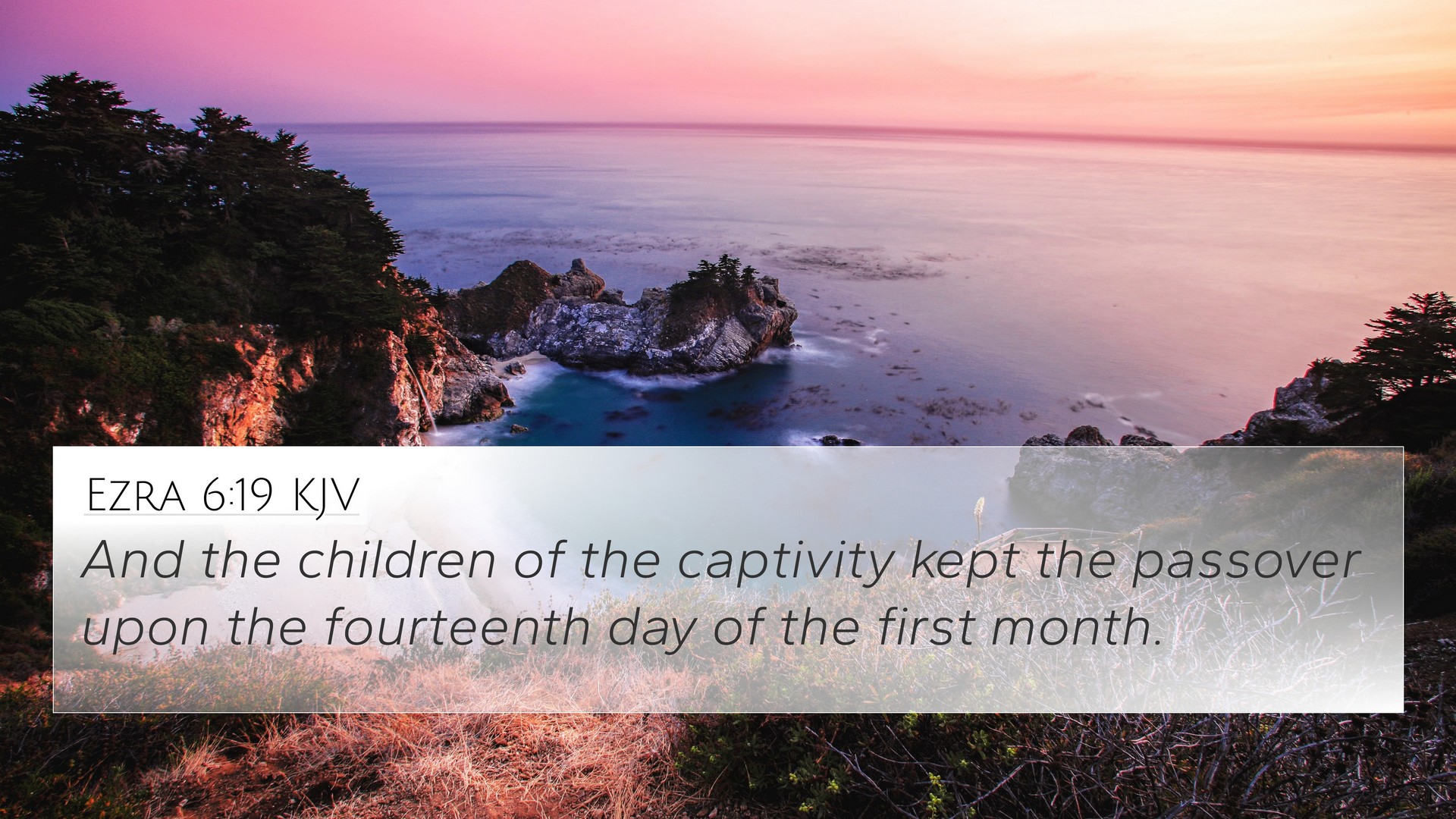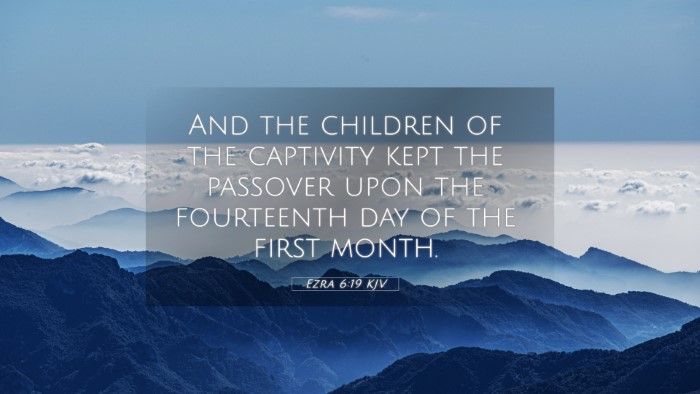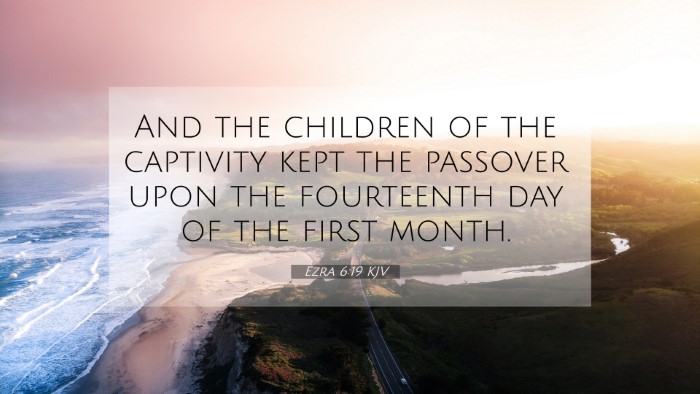Old Testament
Genesis Exodus Leviticus Numbers Deuteronomy Joshua Judges Ruth 1 Samuel 2 Samuel 1 Kings 2 Kings 1 Chronicles 2 Chronicles Ezra Nehemiah Esther Job Psalms Proverbs Ecclesiastes Song of Solomon Isaiah Jeremiah Lamentations Ezekiel Daniel Hosea Joel Amos Obadiah Jonah Micah Nahum Habakkuk Zephaniah Haggai Zechariah MalachiEzra 6:19 Similar Verses
Ezra 6:19 Cross References
And the children of the captivity kept the passover upon the fourteenth day of the first month.
Uncover the Rich Themes and Topics of This Bible Verse
Listed below are the Bible themes associated with Ezra 6:19. We invite you to explore each theme to gain deeper insights into the Scriptures.
Ezra 6:19 Cross Reference Verses
This section features a detailed cross-reference designed to enrich your understanding of the Scriptures. Below, you will find carefully selected verses that echo the themes and teachings related to Ezra 6:19 KJV. Click on any image to explore detailed analyses of related Bible verses and uncover deeper theological insights.
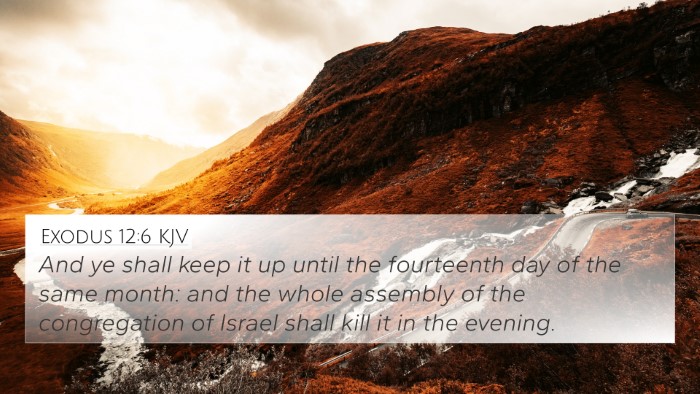
Exodus 12:6 (KJV) »
And ye shall keep it up until the fourteenth day of the same month: and the whole assembly of the congregation of Israel shall kill it in the evening.
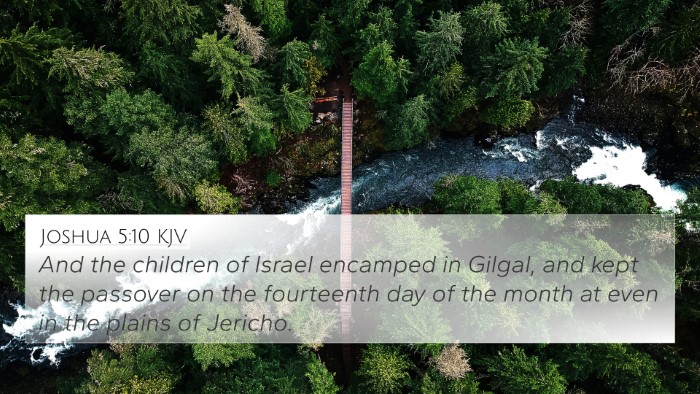
Joshua 5:10 (KJV) »
And the children of Israel encamped in Gilgal, and kept the passover on the fourteenth day of the month at even in the plains of Jericho.
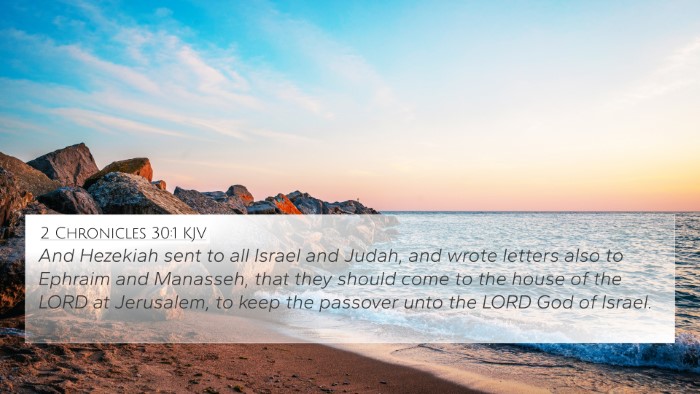
2 Chronicles 30:1 (KJV) »
And Hezekiah sent to all Israel and Judah, and wrote letters also to Ephraim and Manasseh, that they should come to the house of the LORD at Jerusalem, to keep the passover unto the LORD God of Israel.
Ezra 6:19 Verse Analysis and Similar Verses
Understanding Ezra 6:19
Ezra 6:19 states, "And the children of the captivity kept the passover upon the fourteenth day of the first month."
This verse marks a significant moment in the post-exilic community of Israel, emphasizing the importance of returning to their former religious practices after years of exile. It highlights a reconnection with their heritage and a renewal of their covenant relationship with God.
Meaning and Interpretation
The observance of Passover is deeply rooted in the history of Israel, serving as a reminder of God's deliverance from Egypt. The return to this practice reveals several themes that are essential in understanding the context of Ezra 6:19:
- The Restoration of Worship: After returning from exile, the people prioritized reestablishing their worship practices, illustrating the significance of their identity as God’s chosen people.
- Covenant Renewal: Observing Passover was a way to reaffirm their covenant with God, recognizing His faithfulness throughout the generations.
- Community Unity: The act of keeping the Passover together fostered unity among the returned exiles, as they shared in the remembrance of God's mighty acts.
- Symbol of Hope: Passover is not only a remembrance of deliverance but also a prophetic symbol of future hope and redemption.
Connections to Other Scriptures
Ezra 6:19 can be linked to several other Biblical passages, illustrating various themes of deliverance, covenant, and worship:
- Exodus 12:1-14: This passage details the original institution of the Passover, pointing to the foundational event of Israel's liberation.
- Leviticus 23:5: Defines the Passover and establishes its importance within the Jewish calendar and worship practices.
- Deuteronomy 16:1-8: Provides further instructions on how to properly observe the Passover, emphasizing communal participation.
- Luke 22:14-20: Jesus' observance of the Last Supper, which was a Passover meal, connects New Testament believers to the significance of Passover.
- John 1:29: John the Baptist refers to Jesus as the "Lamb of God," drawing a parallel to the Passover lamb.
- 1 Corinthians 5:7: Paul connects Christ’s sacrificial death with the Passover lamb, encouraging Christians to recognize their redemption.
- Hebrews 11:28: Reflects on faith in the context of the Passover, illustrating the ongoing significance of this event in salvation history.
Tools for Bible Cross-Referencing
To deepen your understanding of cross-references such as those found concerning Ezra 6:19, consider using the following resources:
- Bible Concordance: This tool helps locate verses by keywords, facilitating the identification of related passages.
- Bible Cross-Reference Guide: A compilation that lists verses side-by-side concerning similar themes or events.
- Bible Chain References: This approach connects verses in a chain, leading the reader through thematic passages.
- Comprehensive Bible Cross-Reference Materials: Resources that provide extensive connections between scriptures for deeper study.
Comparative Bible Verse Analysis
Engaging in comparative analysis of passages can illuminate the thematic links within Scripture:
- Identifying Connections: Observe the links between Old and New Testaments, particularly focusing on themes of sacrifice, redemption, and divine deliverance.
- Cross-Referenced Themes: Explore how the themes of captivity and freedom are echoed throughout the Bible.
Conclusion
Ezra 6:19 serves as a pivotal reminder of the importance of worship, community, and covenant commitment. By examining this verse alongside various cross-references, believers can gain insight into God's ongoing narrative of redemption throughout Scripture.
Bible Verse Parallels
Understanding Ezra 6:19 in the light of its parallels encourages a richer interpretation and application of its teachings:
- Connections with Historical Context: Recognizing the place of Passover within the broader story of Israel allows for deeper insight into the operations of God's plan.
- Inter-Biblical Dialogue: Engaging with the way other Biblical authors reference the themes of the Passover enhances comprehension of the unity of Scripture.
